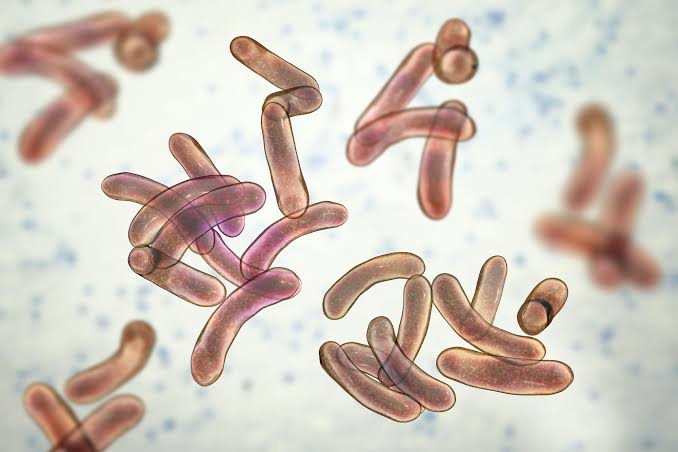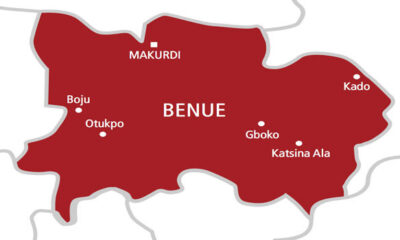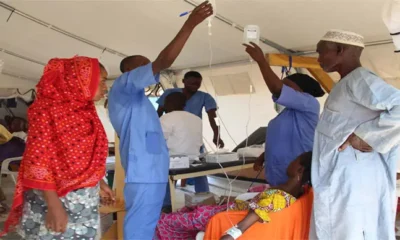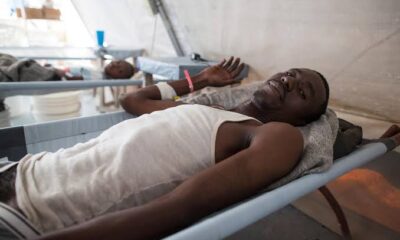Inside Nigeria
Cholera Outbreak: Preventive measures to avoid infection

In recent years, Nigeria has seen several cholera outbreaks in various states across the country.
These outbreaks are frequently associated with inadequate sanitation facilities, a lack of access to clean water, and overcrowded living conditions in urban areas.
In Nigeria, cholera outbreaks have been a persistent public health issue, especially during the rainy season when the disease is spread by unsanitary conditions and tainted water sources.
Among the 139,730 Nigerians who are thought to have contracted the disease nationwide over the course of the last four years, 4,364 have passed away. From 2021 to 2024, the Nigeria Centre for Disease Control released weekly reports on the cholera situation. This analysis was used to determine the incidence rate.
Remember that as the rainy season intensifies, the NCDC has been warning the public about an increasing trend of cholera cases nationwide. On Thursday, June 13, 2024, the agency released a statement signed by Dr. Jide Idris, Director General of the Nigeria Centre for Disease Control and Prevention (NCDC).
It stated that from January 1st to June 11th, 2024, 96 local government areas in 30 states of the federation had reported 1,141 suspected cases, 65 confirmed cases, and 30 deaths from cholera.
The 10 states that accounted for 90% of the cholera cases were named by the NCDC as follows: Bayelsa, Zamfara, Abia, Cross River, Bauchi, Delta, Katsina, Imo, Nasarawa, and Lagos.
At that time, the Lagos State Ministry of Health reported that it had identified 350 probable cases of the illness in 29 wards spread across several LGAs, of which 17 cases had been confirmed.
Severe dehydration brought on by a delayed presentation was the cause of 15 fatalities, the ministry said.
In view of the recent report by the Nigeria Centre for Disease Control (NCDC) regarding the disease outbreak in 30 states of the Federation, it is pertinent to investigate the cause and preventive measures of this water-borne disease.
What is cholera?
Cholera is a highly contagious bacterial disease which affects the small intestine and causes severe diarrhea, posing a significant threat in regions with inadequate water treatment and sanitation.
Cholera cases typically rise during the rainy season, which runs primarily from April to September. This is primarily due to surface run-off, which washes contaminated feces into bodies of water used for drinking.
The consumption of food or water tainted with the Vibrio cholerae bacteria is the cause of cholera. Another common cause of the illness is eating undercooked shellfish.
The only known host for the bacteria is humans, and risk factors for the illness include open defecation, urban slums, camps for internally displaced people or refugees, poverty, inadequate clean drinking water, and poor sanitation habits.
Cholera can be diagnosed by a stool test or a rapid dipstick test, although the dipstick test is less accurate.
Primary symptoms of cholera includes vomiting, sudden onset of profuse watery diarrhoea, which can lead to sudden death as a result of dehydration, if not managed on time, cold skin, sunken eyes, wrinkling of the hands and feet, nausea dry mouth, and weakness of the muscles.
The majority of infected individuals may show no symptoms at all or begin to show these symptoms two hours to five days after exposure.
Treatment and preventive measures
Cholera is an easily treatable disease, if detected early, most infected people can be treated successfully through prompt administration of oral rehydration solution (ORS), with the goal to replace lost fluids and electrolytes.
The ORS solution is sold as a powder that you can rehydrate with either bottled or boiling water. Approximately 50% of cholera patients pass away without rehydration.
Treatment reduces the mortality rate to less than 1%. People who are extremely dehydrated might also require intravenous fluids.
To reduce the spread of cholera, the World Health Organization (WHO) recommends focusing on prevention, preparedness, and response to combat the spread of cholera.
The following precautionary measures should be taken to avert the disease;
- Proper access to potable water that is both safe and clean. This can be achieved by offering sources of clean water, purifying water, boiling and encouraging safe water storage techniques.
- Ensure that food is well cooked before consumption. Avoid raw food such as fruits and vegetables, except you have washed them in safe water or peeled them yourself.
- Avoid contamination of water sources by faeces, indiscriminate refuse dumping through provision of enough sanitation facilities like toilets and appropriate waste disposal systems.
- Promoting good and healthy hygiene by using hand sanitizer and encouraging hand washing with soap and water.
- Provision of adequate vaccination in cholera-endemic areas and during outbreaks especially among children who are mostly at risk.
- Community awareness and education about the causes, symptoms, and preventive measures of cholera in remote areas.
To stop and manage cholera outbreaks in Nigeria , government organizations and public health authorities should give top priority to funding infrastructure related to water and sanitation, surveillance systems, and emergency response plans.































